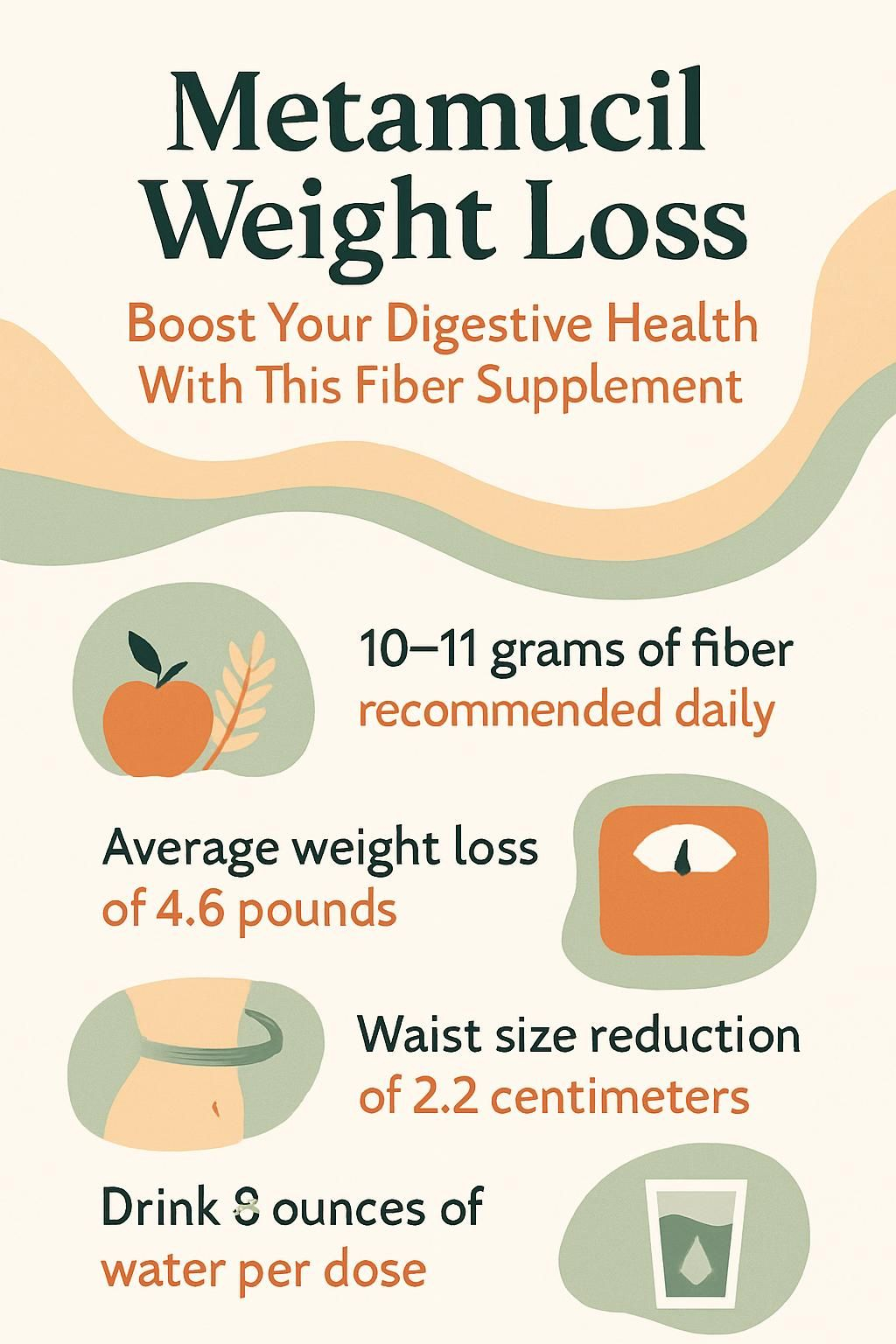Metamucil Weight Loss: Boost Your Digestive Health With This Fiber Supplement
Our Nutrition Assistant AI Suite will transform your body. You will lose fat, get toned, and build muscle. Gain confidence and optimal health.
Struggling with stubborn weight or on-and-off digestive trouble can wear you down. Metamucil uses psyllium husk, a natural nonfermented, gel-forming soluble fiber, to help your digestive health and regularity. This fiber supplement can also support appetite control.
This guide shows how daily Metamucil may help you feel fuller, steady blood sugar, and manage calorie intake. Keep reading to see how a simple routine can fit into your day and help you feel lighter.
Key Takeaways
- Metamucil contains psyllium husk, a gel-forming, nonfermenting soluble fiber shown to support digestive health, lower LDL cholesterol, and improve regularity at daily intakes near 10 to 11 grams.
- Across clinical studies, people using psyllium lost about 2.1 kg, roughly 4.6 pounds, over about five months, mainly by reducing appetite and calories before meals.
- Psyllium slows digestion, helps control post-meal blood sugar in type 2 diabetes, and can reduce waist size by about 2.2 centimeters with steady use.
- Two-Week Challenge participants often report less bloating, more regular bowel movements, and greater fullness when they follow directions and stay hydrated.
- Increase dose slowly and drink at least 8 ounces of water per serving; this reduces gas or bloating and lowers the risk of rare complications.

What is Metamucil?

Metamucil is a fiber supplement made with psyllium husk. It comes as powder, capsules, or wafers, and helps you boost daily fiber intake to support digestive health.
What is Metamucil and how does it work?
Psyllium husk is a soluble fiber that swells when mixed with liquid. It forms a soft gel that moves through your stomach and small intestine, trapping some bile acids and helping waste pass more easily. Each serving helps close the common fiber gap many Americans face.
Many people feel lighter after two weeks of steady use because regularity improves. The Food and Drug Administration permits a health claim for psyllium husk soluble fiber and reduced risk of heart disease when used as directed.
Always mix with at least 8 ounces of water to avoid discomfort. Adding psyllium to a morning glass of juice or a smoothie makes it easier to stay consistent.
“Taking psyllium-based supplements like Metamucil every day helped me feel less bloated and more regular within just a week.”
What are the benefits of psyllium husk in Metamucil?
Psyllium absorbs water and forms a gel, which softens stool and promotes regular bowel movements. It can trap bile acids, so your liver uses cholesterol from your blood to make more. That process lowers LDL cholesterol and supports heart health.
In controlled trials and meta-analyses, people taking psyllium before meals lost about 2.1 kg over several months. The fiber also slows sugar absorption, which helps steady blood sugar. Many users feel fuller between meals with even a teaspoon in water, a common theme in the Two-Week Challenge.
These effects can support a healthier body mass index while easing bloating and digestive discomfort.
How Metamucil Supports Digestive Health
Metamucil adds bulk and softness to stool so waste moves smoothly through your gut. That change often translates to feeling lighter and more comfortable during the day.
How does Metamucil promote regular bowel movements?
Psyllium in Metamucil pulls in water and becomes a gentle gel. This bulks and softens stool, which makes it easier to pass. Clinical trials show psyllium can increase stool frequency and improve consistency.
If you have occasional constipation, start with the labeled dose and increase slowly. People with type 2 diabetes in a 2018 study also reported relief from constipation after starting psyllium. Take each serving with a full glass of water to keep the fiber moving and reduce discomfort.
Can Metamucil reduce bloating and digestive discomfort?
Metamucil can reduce bloating by improving regularity and moving waste along. Many Two-Week Challenge users describe less pressure and smoother digestion.
Mild gas or bloating can happen at first, especially if you raise fiber too fast. Start low, then increase gradually. Hydration is key, since water helps the gel move through your system and keeps stools soft.
User reviews often point to good hydration as the difference-maker. As one user shared about their experience,
After adding Metamucil to my daily routine and increasing my water intake, my bloating improved within days.
Healthcare professionals usually suggest a slow increase in fiber to minimize side effects. These simple steps make Metamucil a dependable tool for comfort and regularity.
How does Metamucil support a healthy gut microbiome?
Balanced digestion sets the stage for a healthier gut. Research suggests psyllium can support a friendly environment for beneficial bacteria with fewer gas-related issues than many fermentable fibers.
Regular use may help waste move efficiently and keep the colon hydrated. The gel structure creates a steady setting where good microbes can thrive. Pairing Metamucil with a high-fiber diet can further support gut health and immune function.
A steady routine often leads to calmer digestion and fewer flare-ups, which many people notice in daily life.
The Connection Between Metamucil and Weight Loss
Metamucil’s psyllium fiber can support appetite control, which may reduce snacking and calories. Evidence from randomized controlled trials suggests a soluble fiber supplement can aid weight loss when combined with healthy eating.
How does psyllium fiber help control appetite?
Psyllium forms a thick gel in your stomach when taken with water. This slows stomach emptying, which helps you feel full for longer.
Intakes near 10 to 11 grams of psyllium per day, especially before meals, have reduced hunger in clinical studies over about 12 weeks. The Two-Week Challenge often highlights fewer between-meal cravings when people use the supplement as directed.
Because digestion slows, many people eat fewer calories throughout the day. That gentle appetite control can support weight and body fat goals.
Why does Metamucil help you feel fuller between meals?
The fiber absorbs water and builds volume in the stomach. That stretch helps signal fullness to your brain and slows how quickly food leaves the stomach.
Clinical trials show greater satiety and less snacking when people take fiber before meals. A teaspoon 20 to 30 minutes before eating often works best, as long as you drink enough water. Over time, the effect can build. Many challenge participants report eating less between meals.
That steady fullness can cut calories and support fat loss during a plant-forward or traditional eating pattern.
Can Metamucil help reduce calorie intake?
Psyllium helps you fill up faster and stay satisfied longer. People tend to choose smaller portions and snack less, which lowers daily calories.
In a meta-analysis of randomized controlled trials, about 10.8 grams of psyllium per day, typically before meals, led to meaningful reductions in body weight. In several studies, waist size fell by about 2.2 centimeters over months of steady intake. The calorie drop is gradual, but it can last when paired with healthy food choices and water.
Simple habits like pre-meal fiber and mindful portions can make your plan easier to follow.
Benefits of Using Metamucil for Weight Loss
Metamucil can make weight management feel simpler by supporting digestion and appetite control. Small daily steps add up over weeks and months.
How does Metamucil support sustainable weight management?
Psyllium’s gel slows digestion and helps you feel satisfied between meals. That makes it easier to stick to portions and skip extra snacks. Studies show gradual, steady weight loss, often close to one pound per month compared with placebo.
Many Two-Week Challenge participants notice fewer cravings and better control. Add regular movement and a balanced eating plan with produce and whole grains for stronger results. Increase fiber slowly to keep side effects low. Consistency is the secret to sustainable progress.
Can Metamucil help maintain healthy blood sugar levels?
Stable blood sugar supports steady energy and appetite control. Taking psyllium before meals slows how quickly carbohydrates are absorbed. In a 2016 study, people with type 2 diabetes improved glycemic measures with psyllium.
Use Metamucil as part of your plan and talk with your healthcare provider if you take diabetes medications. Timing and dose matter when you are managing glucose.
How does Metamucil improve overall digestion?
Psyllium absorbs water, increases stool bulk, and softens waste. That combination helps your body remove waste more efficiently. Many people notice more regular bowel habits within two weeks, especially during the challenge.
Less bloating, less strain, and smoother digestion can follow. Better gut comfort also makes it easier to stay active and stick to your routine.
Metamucil’s Two-Week Challenge
Many people test how fiber fits their lifestyle with the Two-Week Challenge. It is a quick way to sample the benefits and see how you feel.
What is the Metamucil Two-Week Challenge?
For 14 days, you take a daily dose of Metamucil, powder or capsules, to raise fiber intake. Email tips and reminders help you build a routine and track progress.
Most participants notice changes like less bloating and more regular bowel movements within two weeks. It is a simple path to discover if Metamucil supports your goals for appetite, weight, and digestion.
How does the challenge promote digestive and weight health?
Daily psyllium supports regularity and can ease common discomfort. People often report feeling lighter, less bloated, and more energetic after the first week.
Higher fiber before meals can curb hunger between meals. Some participants also see better cholesterol and steadier blood sugar. The challenge adds structure, which helps you meet your fiber target and build momentum for longer-term habits.
What are tips for starting and staying consistent with the challenge?
Small, steady habits improve your odds of success. Use these practical steps to get started and stay on track.
- Begin with a single serving daily to let your body adjust, which lowers the chance of gas or bloating.
- Pick the format that fits your life. Powder mixes into water or smoothies, while capsules are handy on busy days.
- Choose a set time each day, such as before breakfast or with dinner, to build a routine.
- Put the powder in a dry glass, add cool liquid, stir well, and drink right away to avoid clumps.
- Blend into a smoothie with yogurt, banana, and mango juice for flavor without extra sugar.
- Drink at least 8 ounces of water with every serving. Hydration supports comfort and fiber movement.
- Invite a friend or family member to join. Shared goals boost motivation and accountability.
- Read the label directions and set realistic goals for fullness, regularity, or fiber intake.
- Track appetite, bowel habits, or energy in a notebook or app to spot improvements.
- If you miss a dose, take the next one as planned, and keep going without stress.
- Increase serving size slowly. Many people wait 2 to 3 days before any change in dose.
Mixing the powder with orange juice can make it more enjoyable. Simple tweaks like this help you stay consistent through all 14 days.
How to Use Metamucil for Weight Loss
Powder and capsules can both support weight goals. Dose, timing, and hydration determine how well psyllium works for you.
What are the recommended dosages and timing for Metamucil?
A practical range for appetite control is 10 to 11 grams of psyllium per day in two or three servings. Take it 20 to 30 minutes before meals to enhance fullness and reduce hunger.
For powder, use the labeled serving in at least 8 ounces of water. Capsules usually require several pills per dose; follow the product directions. Start with one small serving daily and increase gradually. Do not exceed the labeled daily maximum. Consistency matters more than size of dose.
Which is better for weight loss: powder or capsules?
Powder makes it easier to reach an effective daily amount for appetite control. It blends into water, juice, or smoothies, and sugar-free options keep calories lower. Taking powder before meals has shown the strongest fullness effects in studies.
Capsules are convenient when you travel, but often require many pills plus a full glass of water. Many people use powder at home and keep capsules for on-the-go use. Whichever you choose, pair each serving with enough liquid.
Why is drinking enough water important with Metamucil?
Psyllium soaks up liquid and forms a gel. Without enough water, the gel can become too thick, which raises the risk of choking or a blockage.
Mix each powder serving with at least 8 ounces of liquid and consider another glass afterward. Swallow capsules with at least 8 ounces of water as well. Good hydration helps the fiber move smoothly, reduces gas and bloating, and supports appetite control.
Never take powder dry or with hot liquids. Water is essential for safe, effective results.
Realistic Expectations for Weight Loss with Metamucil
Metamucil supports slow, steady change. Think of it as a helpful tool that works best with smart eating and regular activity.
How much weight can you realistically lose with Metamucil?
In clinical studies, average weight loss with psyllium was about 2.1 kg, 4.6 pounds, over roughly five months. Many people see about one pound per month when they use 10 to 11 grams daily before meals. Waist size often decreases by about 2.2 centimeters over time.
Results vary based on calorie intake, activity, and consistency. Metamucil is not a quick fix, but it supports steady progress for people who stick with a routine.
What timeframes and consistency are needed for results?
Fullness and appetite control usually appear within 12 weeks of daily use. Changes in weight and waist size often show after several months.
The Two-Week Challenge provides a strong start, yet meaningful weight change takes longer. Missed doses here and there will not stop progress; benefits build with consistency. Some analyses also report better fasting insulin with ongoing daily use.
Tracking your intake helps you stay on course and notice small wins, such as fewer cravings and more regularity.
How should Metamucil be combined with diet and exercise?
Aim for 25 to 34 grams of total fiber per day from food and supplements combined. Use Metamucil to help fill the fiber gap. Base meals on fruits, vegetables, beans, and whole grains. A practical guide is about 14 grams of fiber per 1,000 calories eaten.
Light movement after meals, even a 5 to 10 minute walk, can help manage blood sugar and support metabolism. Increase fiber slowly to reduce gas or cramps. Hydrate well so the fiber works comfortably.
Potential Side Effects of Metamucil
Most people tolerate psyllium well, especially with a slow start and good hydration. A few may notice gas or mild cramps at first.
What common side effects can Metamucil cause?
Mild gas, bloating, or stomach cramps are the most common early effects. These usually ease as your body adapts to higher fiber. Belching and discomfort can happen if the dose rises too fast.
Serious issues like choking or a bowel obstruction are rare, and the risk drops when you take each serving with plenty of water. Most users find symptoms fade within days or weeks as they adjust.
How can side effects be minimized when taking Metamucil?
Start low and increase gradually. Mix powder with the full amount of liquid, then follow with another glass of water. If you prefer capsules, swallow with at least 8 ounces of water while upright.
Separate psyllium from other oral medications by at least two hours to limit interactions. Stay hydrated throughout the day. If bloating or discomfort appears, hold your dose steady or reduce slightly, then try increasing more slowly.
Reach out to a healthcare provider if symptoms are severe or persistent.
When should you consult a healthcare provider about Metamucil?
Seek medical advice right away if you have severe abdominal pain, rectal bleeding, vomiting, or constipation lasting more than 7 days. Stop use and get help if you have trouble swallowing, signs of blockage, or a known allergy to psyllium.
People with diabetes, Crohn’s disease, ulcerative colitis, or other GI conditions should consult a healthcare provider before starting. Psyllium can affect how some medicines are absorbed, including those for blood sugar or cholesterol.
Additional Health Benefits of Psyllium Fiber
Psyllium does more than aid regularity. It can support heart health and help with blood sugar control as part of a balanced lifestyle.
How does psyllium fiber support heart health?
Psyllium’s gel traps bile acids in the gut. Your liver then uses blood cholesterol to make new bile acids, which can lower LDL cholesterol over time.
Consistent intake, combined with a diet low in saturated fat, has reduced LDL in clinical trials. Doctors often recommend psyllium for cholesterol support since many people fall short on dietary fiber. The cholesterol effect is one of the top benefits of this supplement.
Can psyllium fiber help maintain healthy blood sugar levels?
Taking psyllium before meals can slow carbohydrate absorption. This helps keep blood sugar steadier after eating. A 2016 trial reported improved glycemic control in people with type 2 diabetes who used psyllium compared with placebo.
Use it alongside a balanced diet and regular activity for best results. Many people notice fewer energy dips, which makes it easier to avoid sugary snacks.
How does psyllium improve overall gut health?
Psyllium absorbs water and forms a gel that traps waste, helping it move out of your body more easily. Hydrating the colon supports smooth, regular bowel movements.
Beneficial bacteria can use components of fiber, which supports a healthier gut community. Many users report less constipation within a week when they pair psyllium with enough water.
Who Should Avoid Metamucil?
Most adults can use psyllium safely with proper hydration. Some medical conditions and allergies call for extra caution or avoidance.
Which medical conditions require avoiding Metamucil?
People with diabetes, Crohn’s disease, or ulcerative colitis should talk with a healthcare provider first. Those with dysphagia, trouble swallowing, should avoid psyllium because of choking risk.
Stop use and seek care if you have rectal bleeding, severe abdominal pain, vomiting, or constipation that lasts more than 7 days. Do not take psyllium without enough liquid, since that can raise blockage risk.
If you take prescription medicine, ask your clinician about timing. Take oral medications at least two hours apart from your fiber dose.
Who might have allergies or sensitivities to psyllium?
Allergic reactions can include itching, rashes, swelling, or breathing problems. If you have had reactions to fiber supplements, avoid psyllium and seek medical advice.
People with swallowing problems face a higher choking risk and should not use this supplement. If you manage diabetes or take multiple medicines, talk with your healthcare provider before starting psyllium.
Tips to Maximize Results with Metamucil
Small habits make a big difference. Combine fiber, water, and movement for better weight and digestive outcomes.
How can pairing Metamucil with a high-fiber diet help?
Using Metamucil alongside a high-fiber eating plan improves fullness and regularity while adding important nutrients from whole foods. Aim for 25 to 34 grams of total fiber daily. Most people do not get enough from food alone, so this combo helps close the gap.
Start low and work up to about 10 to 11 grams of psyllium per day as tolerated. Take it 20 to 30 minutes before meals for best fullness. Drink plenty of water to avoid bloating and choking risk.
Why is staying hydrated important when using Metamucil?
Psyllium expands and thickens in the gut. Without enough water, it can be hard to swallow and may cause a blockage. Always mix powder with at least one full glass of liquid, then consider drinking another glass soon after.
Begin with a small dose and increase slowly while tracking your daily fluid intake. Hydration improves comfort, digestion, and appetite control during your two week challenge.
How can tracking progress improve your results?
Tracking helps you see what is working. Log your weight, waist size, appetite, and energy levels. Even quick notes can reveal patterns over time.
Many users report less bloating and more energy within two weeks of steady use. Pair tracking with simple lifestyle changes for better weight management and smoother digestion. Seeing progress keeps motivation high.
Common FAQs About Metamucil and Weight Loss
Here are direct answers to common questions about Metamucil, weight loss, and daily routines. Use them to fine-tune your plan.
Can Metamucil be used as a meal replacement?
No. Metamucil is a fiber supplement, not a complete meal. It lacks protein, vitamins, minerals, and healthy fats; your body needs these for energy and recovery.
Taking it before meals can help with fullness. You still need balanced food to maintain health and performance.
Is Metamucil safe for long-term use?
For most people, yes. Many Americans do not get enough fiber, and psyllium can help fill that gap. Always take it with enough water to lower the risk of obstruction.
If you have diabetes, Crohn’s disease, or other GI conditions, talk with your healthcare provider first. Start low and increase slowly to reduce gas or bloating as your body adjusts.
What is the best time to take Metamucil?
Consistency leads to the best results. For appetite control, take it 20 to 30 minutes before meals so the gel can form in your stomach.
Mix powder with cool liquid and drink right away, then follow with at least 8 ounces of water. Beginners can start with one small serving daily and work up based on comfort.
Conclusion
Metamucil can support digestive health and modest weight loss by helping you feel full and stay regular. Many people notice less bloating and steadier blood sugar, which makes it easier to manage appetite and daily calories.
Best results come from a complete plan. Pair your fiber supplement with balanced meals, movement, and plenty of water. If you have a medical condition or take medications, talk with a healthcare provider before you start. Stay consistent, track small wins, and give the routine time to work.
Evidence highlights: FDA-authorized health claim for psyllium husk soluble fiber and heart disease risk reduction; randomized controlled trials and meta-analyses show appetite reduction, modest weight loss, improved LDL cholesterol, and better post-meal glycemic response.
FAQs
1. How does Metamucil help you lose weight?
Metamucil is a fiber supplement that can support weight loss by increasing feelings of fullness after eating. This effect may reduce overall calorie intake compared with placebo, as shown in some clinical studies evaluated by the Food and Drug Administration. Most Americans do not get enough fiber in their diets, so adding a supplement like Metamucil can improve digestive health and support healthy weight management.
2. What are the main ingredients in Metamucil, and are there any concerns for people with certain health conditions?
Metamucil contains psyllium husk, a natural fiber, and may include a sugar substitute for flavor, such as in the Orange flavor variety. People with phenylketonuria should check the label for aspartame, and those with Crohn’s disease should consult a doctor before use, as fiber supplements can affect digestive symptoms.
3. How much fiber do Americans get on average, and why is this important for overall health?
On average, Americans get less fiber than recommended for optimal health. The recommended daily intake is about 25 grams for women and 38 grams for men, but most people fall short. Adequate fiber intake supports digestive health, helps regulate blood sugar, and may aid muscle function.
4. Can Metamucil be used safely with other dietary supplements or medications?
Metamucil is generally safe, but it is important to take it at a different time than other medicines to avoid interactions. Always check with a healthcare provider before starting any new supplement, especially if you have health conditions like Crohn’s disease or take medications that affect the digestive system.
Summary: Metamucil is a fiber supplement that can support digestive health and may help with weight loss by increasing fullness. It contains psyllium husk and sometimes a sugar substitute, so people with certain health conditions should read labels carefully. Most Americans do not get enough fiber, making supplements like Metamucil a useful option for improving overall health. Always consult a healthcare provider before starting new supplements, especially if you have medical conditions or take other medications.







